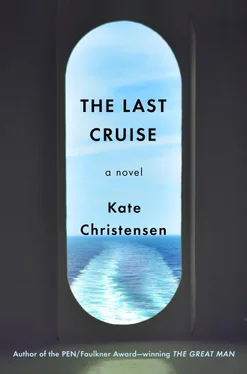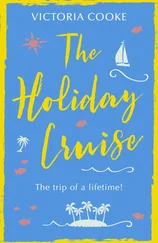Miriam soared with him, left her body and herself behind and willfully went with him somewhere, where the two of them were conjoined in a twisting dance… Honestly, nothing like this had ever happened with any other piece of music. It was too much. Maybe it was the setting, the light, the romance of the ship. They were playing in the open air, up on the top deck, near the blue-green lit-up swimming pool, under a starlit sky, in candlelight, with torches lit, potted palm fronds rustling and the ocean wind scouring the ship’s surfaces with its salt-rasping tongue. In the dim light, Miriam saw her old friends as if they were young again. All their faces looked awake, sharpened, excited. She knew hers did too.
And there it was again, Sasha’s gaze, seeking out and meeting hers as he played unerringly. They both knew these parts by heart. His eyes were reassuring and playful and full of love, and she felt her own eyes answer him. It was that night again, the one so many decades ago, the night she’d felt herself falling in love with him the first time they’d played the Rosamunde. The feeling hadn’t gone away since then; it had just been in abeyance, held in reserve somewhere, invisible.
Long into the early morning hours after that performance, Miriam lay in bed, too thrilled to sleep, listening to her ex-husband’s gentle snoring, not bothered by it at all. She was happy to be awake, happy to be a violinist, happy to be on the Pacific Ocean again, her natal sea, the ocean that felt most like home to her. But she wasn’t thinking about the ocean. She could only think of Sasha, how kind he was, how graceful and determined, how handsome his face had looked tonight in the starlight and candlelight. He had been so unhappy since his wife died. He’d been a shadow of himself. Tonight, he had come back to her, the Sasha she’d always loved.
She loved him, and she always had.
The thoughts she was having! Like a silly young girl. She’d never had these thoughts about Isaac, and he was her life’s mate, the father of her beloved children. Sure, she had loved him when they were younger, even though he hadn’t made her heart do flips. They’d always been friends and partners, making a life side by side, until they’d eventually started fighting all the time and gotten sick of each other and ended the whole thing. He’d never made her swoon, never given her these crazy, ridiculous thoughts of souls and dances and exaltation. She’d never felt this way about anyone, ever. Except, of course, for Sasha.
Well, here they were on a ship together, maybe for the last time in their lives, or one of the last times, since the quartet would not be able to perform for much longer; their minds and bodies were all failing in various ways. That night may have been the last time they would ever play the Rosamunde, their final performance.
Miriam had to get up out of bed and breathe the fresh air and stand outside and look out at the ocean; her whole skin was tingling, her mind was encased in a bubble that wanted to float out of her skull. The music had ended, but the feeling remained. After being a professional musician for more than half a century, the idea that music might cause something real to happen, might inspire feelings that were true and actual, was a revelation to her. She had heard it could happen, but she’d never believed it, no more than she’d believed in religious visions or near-death tunnels of light or astrological predestination. She was rigorously pragmatic. She was empirical, grounded, and above all else, skeptical.
Schubert had undone her. Of course it would be Schubert. No other composer could slide his melodies straight into the heart so you wept without knowing why you were weeping. His music had the effect of the greatest poetry, of the most humane and beautiful and heartfelt words, but wordless, far more direct, elemental almost.
She got out of bed and silently put on her bathrobe. Pocketing her room key, she eased the door shut behind her and went along the corridor to the door that led out onto the walkway. Outside, she leaned against the railing and looked down at the dark ocean, watching small curlicues of whitecaps glowing in the still-dark early morning air.
The door opened. Someone came out onto the walkway and moved with purpose toward her. For a moment she feared it was Isaac, come to tell her to go back to bed, dammit, was she nuts, did she know what time it was, it was three o’clock!
But no, it was Sasha. She’d known he’d come out, she realized. He was wearing his bathrobe too. She looked at him, and he looked at her, and both their faces were alight, open, and smiling.
“Since Sonia died,” he said to her in a quiet voice once he was at the railing standing next to her, “I’ve begun to feel this way again.”
“This way again,” she repeated, as if she were asking, but she was really assuring him that she knew exactly what he meant. He had invited her into that strange, ardent, mysterious dance, and she had responded, had let her own playing answer him. But tonight wasn’t the first time he had sought her out in the Rosamunde.
All of a sudden, it all made sense to her, clearly, and even though it was nuts, illogical and absurd, she believed it.
*
The breeze was alternately brisk and balmy, cool with pockets of warmth, like a mountain lake. The hazy air looked as liquid as the salt water, and the ocean held as much light as the sky. To Christine, standing at the railing looking out to sea, the entire world was a blue-gold fantasia punctuated with spray, shaded with pastel colors and shadows. She hugged her bare arms, her hair blown by the mild salt wind, her eyes bedazzled by the sunlight on the diamond-bright sea surface that shimmered in glinting, changing points of color all the way to the horizon. The waves were a cohesive, unbroken sheet of heaving water, turned by the sun into pure light and reflection, gone shapeless with brilliance.
While Valerie worked, Christine drifted around the ship, doing as she pleased. She felt a distance between herself and everyone else on board, crew and passengers alike, almost as if she were invisible. She listened in on other people’s conversations. No one seemed to mind or notice. She felt encased in a shield that conferred absolute social solitude. It made her relaxed and jumpy at the same time, comfortably anonymous but uneasy at this enforced idleness, no one needing her, nothing to do but observe and think and indulge herself. In the open-air breakfast bar on the patio by the pool, she got a cup of coffee and a freshly baked pastry. She read her book in the shade of an umbrella to the sounds of splashing and laughter and conversations around her. She had finished A Handful of Dust and had exchanged it for A Passage to India. It was sheer luxury to reread literary classics. After a few hours, when she got hungry again, she ate lunch down in the buffet, a sandwich, a salad, a glass of wine. After lunch, she went up to the solarium at the very top of the ship and fell asleep in a deck chair. Her nap was wine-drugged, comatose, filled with exciting dreams. She awoke as the slanting afternoon sun sent a shadow creeping over her skin, sat up and slid her feet into her sandals and made her way down the stairs to the pool bar.
“Christine,” said the bartender, her new friend Alexei, reaching for the shaker, “how has your afternoon been?”
“Another perfect day,” she said, yawning, and they both laughed. “How are you?”
“Things could be worse,” he answered. He was elfin and pale, with a pouf of yellow hair. She worried about him, and what would befall him when this cruise was over. The recording of Valerie’s interview with that chef, Consuelo, now permeated every interaction she had with the ship’s workers.
Читать дальше












